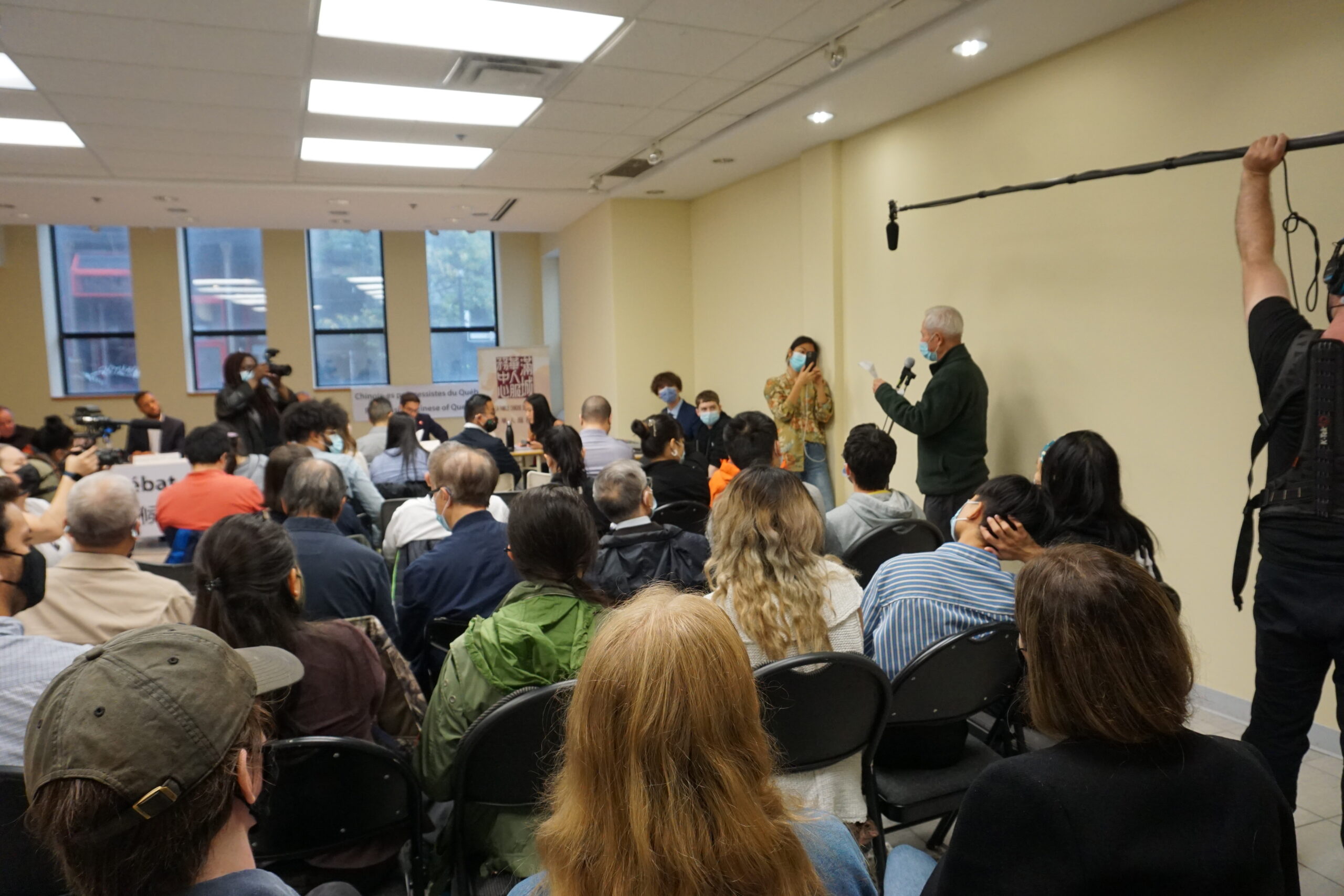On Saturday, municipal candidates go head-to-head in Montreal’s famous and neglected neighbourhood
This past Saturday, Montreal’s Chinese community had their voices heard in the first-ever municipal debate in Chinatown. With the municipal election coming up on Nov. 7, participants and candidates discussed solutions to protect the last Chinatown in Quebec.
On Oct. 16, the Progressive Chinese of Quebec (CPQ), Chinese Family Service of the Greater Montreal Area (CFS) and the Chinatown Working Group (CWG) hosted the debate in the Chinese Community & Cultural Centre of Montreal on Clark St. at 11:30 a.m. Almost 100 community members of all ages poured into the conference room, with media organizations interviewing them at every corner.
The goal of the debate was to hold the municipal government accountable for the responsibility of Chinatown. CWG member and event organizer May Chiu expressed her excitement for this historical debate. “We’re hoping that community members will come out and ask questions to the candidates and get them to commit to their promises,” she said.
Community members were overwhelmed with emotion as they felt recognized by the municipal government. “It’s about time,”* activist Janet Lumb told The Concordian. “We’ve been fighting for many years to have the recognition and acknowledgement [from the municipal government] of the fact there are some serious issues that need to be confronted and dealt with,” she explained.
Candidates who were present include Mouvement Montréal’s mayoral candidate Balarama Holness, Ensemble Montréal’s candidate councillor Aref Salem, Projet Montréal’s Robert Beaudry, and Action Montréal’s candidate councillor Robert Sévigny along with Jean-Christophe Trottier, who left the debate before it started, due to his refusal to comply with health safety guidelines.
Throughout the pandemic, Montreal’s Chinese and other Asian communities experienced a rise in hate crimes, ranging from vandalism, robbery and physical assaults. In addition, most of Chinatown’s properties are at risk of gentrification and businesses are struggling to make ends meet. Around 108,000 Montrealers claim Chinese ancestry, with many more a part of the general Asian community.
Last year, Mayor Valérie Plante proposed an action plan to help preserve and improve the cultural integrity of Chinatown by adding more green spaces in the area, increasing pedestrian access to the neighbourhood and building social and affordable housing units.
The debate began at 12 p.m. with words of appreciation by May Chiu and the Tiohtià:ke land acknowledgement in French and English, followed by the Mandarin and Cantonese translations.
The two-hour debate covered five topics:
- Protecting Chinatown’s heritage
- Social and racial justice
- Arts and culture
- Climate justice
- Economic development
In Holness’ introduction speech, he discussed his familiarity with the neighbourhood and his appreciation of Chinese culture by retelling his memories of visiting Chinatown as a child and living in China. He also threw in a couple of words of Mandarin, which took the audience by surprise.
Holness said Movement Montréal would establish a registry in the neighbourhood where businesses receive wage subsidies and tax breaks for their rent to protect Chinatown’s roughly 150 businesses, emulating similar initiatives used in San Francisco for its Chinatown and other heritage sites, he argued.
Ultimately, Holness concluded that the debate helps people “collectively improve the lives and livelihoods of Chinatown.”
Projet Montréal’s Beaudry said Valérie Plante’s party has close relations with arts and cultural organizations to help boost financing BIPOC art programs in the neighbourhood, as communities continue to face funding disparity from the provincial government. This initiative supports the cultural integrity of the neighbourhood.
He said the decisions made in Chinatown should go through the Chinese community first. “We want you to show us what you want to happen in Chinatown. It’s not a top-down situation, it’s a bottom-up situation.”
Salem said Ensemble Montréal will implement social housing for the homeless shelter near Chinatown, as well as provide social resource centres throughout the neighbourhood. “We need social housing [to] bring more people to this part of the city and we need to have some cultural events in the city so people can visit, and live, here in peace and harmony,” he added.
Action Montreal’s Sévigny mentioned protecting the environment, regarding the neighbourhood’s demand for green spaces in public and private areas. Before being required to leave the debate, Trottier said they will demand the provincial government to grant Chinatown as a heritage site, improve the infrastructure of Chinatown and impose stricter bylaws to prevent further construction, as well as creating a better dynamic with the Chinese community.
Photograph by Mohammed Khan
